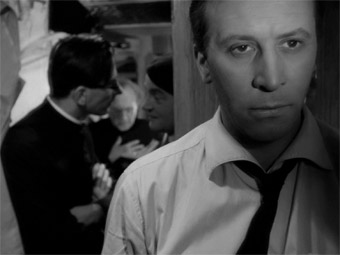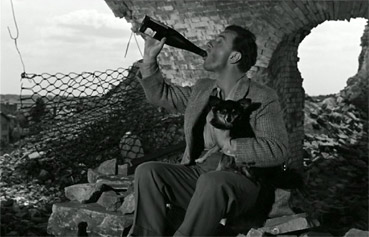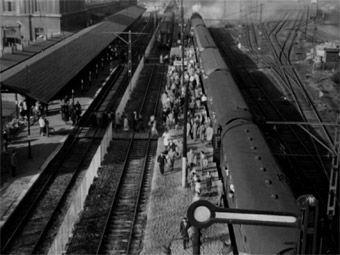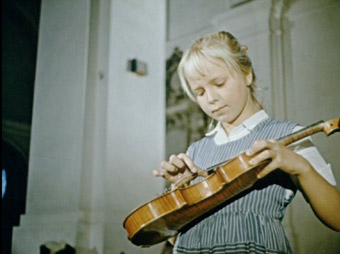|
There's something deliciously Hitchcockian about the premise of Night Train, a wolf-among-sheep thriller focusing on the passengers of an overnight express train and the killer in their midst, but its slippery execution amounts to much more than just a straightforward suspense picture. Jerry Kawalerowicz and co-writer Jerzy Lutowski arrange the suspects early on: Leon Niemczyk is Jerzy, the enigma in shades, and Lucyna Winnicka is Marta, his smoldering companion. Staszek (played by Innocent Sorcerers' Zbigniew Cybulski) is the stowaway lover pleading for her heart, and elsewhere The Priest (Witold Skaruch) debates God with a snarky insomniac (Zygmunt Sewruk). Lastly there's the irresistibly flirty lawyer's wife (Teresa Szmigielówna), who gossips and teases her way through the journey, attempting to hook up with any man who passes her a glance (the workaholic husband, an oblivious cuckold played by Aleksander Sewruk, is rarely seen onscreen).
For the first hour Kawalerowicz refuses to acknowledge the mystery at the film's heart, but any notion of Night Train playing out as a traditional thriller should have be dispelled from the opening frame, an extraordinary overhead shot of Łódź Kaliska station, scored by the airy, elemental vocals of Wanda Warska. DP Jan Laskowski goes on to quickly establish an unsettled atmosphere, employing high-angle shots to lend us the feeling of being concealed voyeurs. From this private vantage point we can observe an especially complicated relationship between soon-to-be-bunkmates Jerzy and Marta. The former hops aboard the express claiming to have lost his first-class ticket and, clearly flustered, buys up compartments 15/16 from the rosy-cheeked conductor (Helena Dąbrowska). But a quick scan of the quarter reveals a woman's purse tossed across the lower bunk. It's revealed to belong to the beautiful Marta, whose flowing blonde locks are only less seductive than her soft, attentive eyes (Winnicka also played the lead in Kawalerowicz's astonishing Mother Joan Of The Angels). The pair decide to share their double-booked compartment, but come under close observation from their fellow commuters.

As Kawalerowicz observes the behavior of each passenger I began to forget the film's mystery angle. Keeping the framing tight around Jerzy's compartment, we are denied the opportunity to incriminate potential red herrings. The lawyer's wife appears unassuming, but she's as likely a suspect as any one of these sad, desperate characters. Perhaps more than a thriller Night Train is a compelling study of loneliness and isolation, an idea compounded by the killer's unassuming reveal. As they are chased into the surrounding woodland, the film's palette darkens severely, surging with the impulsive bloodlust of mob psychology; Kawalerowicz's juxtaposition of wide angles and perspective shots at once making us feel like participants and omnipresent observers in the vigilante swarm. The killer's bruised puppy dog eyes recall Peter Lorre in M, and only then, as he/she is were carried away by the police, did I became aware that there were still twenty minutes left on the clock. Night Train's climax is compellingly offbeat, and as Warska's ghostly vocals spill over the final fade you'll be left with more questions than answers. For starters, study the final panning shot of the train closely and see what you find reflected in its windows.
'A Heroic Symphony In Two Parts', Andrzej Munk's WWII comedy Eroica stages two tales of valour against the backdrop of 1944's Warsaw Uprising. Part one, Scherzo alla polacca, tells the story of Gorkiewicz (played with deadpan relish by Edward Dziewonski), a yellow-bellied husband recruited into the Polish militia, whose return home leads him on a hopeless quest to broker an arms deal between the Poles and occupying Hungarians. It all begins when Gorkiewicz takes an air raid as the sign to flee his comrades and return to the arms of his wife, Zosia (Barbara Polomska), who in the meantime has taken up with a suave Hungarian, Lt. Kolya (Night Train's Leon Niemczyk). It's not long before our hero is blundering his way through war zones in an attempt to cash-in on the conflict, but with the whiff of failure stinging his nostrils the fool retires to a local hen-house and gets blind drunk on vintage whiskey. Screenwriter Jerzy Stefan Stawinski appears to be criticizing those who fought in 1956's Poznań insurrection*, underlining the futility of 'heroism' by making his protagonist such an oblivious dimwit. Through Gorkiewicz's eyes we are denied the bigger picture of conflict, as any sense of its national impact is ignored, only ever amounting to a set of impossible odds for our hapless, Chaplin-esque hero to overcome. It's telling that he sees Lt. Kolya not as a threat to his country's security but rather his marriage. Munk engages with some complex ideas here, but within the compressed timeframe he leaves little room to expand on them, instead crafting a farcical satire of wartime Warsaw, and the feckless folk who got lost amid its chaos.

Part two, Ostinato lugubre, focuses on a POW camp whose prisoners daydream of freedom, inspired by the successful escape of ex-bunkmate Zawistowski (an unrecognizable Tadeusz Łomnicki), who is actually hiding out in the bathroom's ventilation system. Stawinski's scripting has greater focus here, his structure is tighter, and the opportunity for satire much juicier. DP Jerzy Wójcik builds an ever-narrowing sense of unease, accentuated as the camp's claustrophobic confines begin to gnaw away at each man's sanity. Lt. Zak (Józef Kostecki), the disgruntled night owl of the camp, is particularly fascinating to observe, and Lt. Turek (Kazimierz Rudzki), the stern introvert who sleeps during the day so that he may keep company with Zawistowski after nightfall, is equally interesting. The characters here are so brilliantly defined, so complicated and empathetic, that Ostinato lugubre's only real downfall is how little time we get to spend with them. Still, it's great while it lasts, as Munk expertly juggles the bleak realism of his scenario with a vein of pitch-black comedy, never better exemplified than in the bitterly ironic ending, a much gentler and affecting consideration of the 'heroism-is-futile' theme in Scherzo alla polacca. Honestly, it's very hard to review Eroica without the ability to properly contextualize its tales, and I'm sure some of Munk's broader political points would resonate more with a Polish audience. But those like myself, uneducated in the country's history, will still find a lot to love in this bold, consistently funny symphony. I just wish it was longer.
In common with all of the films in this excellent box set, the picture here has been carefully restored and the results are once again impeccable, with an excellent level of detail (at least for a standard definition transfer), a strong contrast range and solid black levels, though this does mean that we sometimes lose a little fine detail on black clothing or in deeper shadows. The picture is very clean, with almost no visible dust spots and no obvious traces of damage repair. The film is framed in its original 1.33:1 ratio.
The Dolby 2.0 mono soundtrack is clear and free of background hiss. The range is narrower than you'll find on more modern films, but even the louder sound effects and dialogue are free of distortion.

Eroica boasts a similarly high quality transfer, one whose contrast and level of detail is once again of the highest standard, and here there is no drop-off in quality whatesover in the darker scenes, a degree of consistency that's rare even on DVDs of a good many modern films. In common with the other films in the set, there's hardly a dust spot to be seen and the picture is rock solid, with no hint of frame jitter or obvious damage. The framing is an unusual (but apparently accurate) 1.56:1 and the picture is anamorphically enhanced.
The Dolby 2.0 mono track is completely free of hiss or damage, and despite a dynamic range that betrays the film's age, is otherwise very clear and distortion-free.
Night Train
An excerpt from My Seventeen Lives, (a 2009 documentary about Kawalerowicz due for release later this year), serves as an interesting little tidbit, but feels somewhat lost on its own terms. Still, certainly worth a watch, if only for the extraordinary-looking footage of his 1957 feature The Real End Of The Great War. The 16-page booklet, dedicated to the memory of Kawalerowicz, features two essays by critic/historian Michael Brooke, one on Night Train and the other on its director. Both are fascinating and highly readable pieces, contextualizing the work both politically and within the varied and controversial canon of its creator.
Eroica
First there's an accompanying essay, this time penned by author/lecturer Dr. César Ballester, who dedicates the piece to Munk (he died tragically young at the age of 40). Across 16 pages Ballester discusses Eroica in great and precise detail, mapping out the socio-political landscape which produced and received the film. It's a little too formal for my tastes, but still a fascinating piece, and essential reading for anyone interested in Polish history.

On the disc we're treated to Munk's 1958 short A Walk In The Old Town Of Warsaw [Spacerek staromiejski], which follows a young girl (fashioned like Lewis Carroll's iconic Alice) as she tours her violin around – you guessed it – the cobbled, war-torn streets of Warsaw. Shot in colour by DP Kurt Weber, the film is an extraordinary fusion of sound and editing, with Munk employing eerie angles and Andrzej Markowski's heightened electronic score (way ahead of its time), to express the dislocation of our protagonist. In his review on KinoBlog Michael Brooke suggests the film as the "psychological study of a young violin student whose studies have made her hypersensitive to the creative potential of the sounds she hears during an otherwise routine walk"** and as such it's a fascinating little item. The girl's perspective shots are especially effective when animating the inanimate, like the scene in which she observes a great bricked arch, and its engraved cannons swap fire in a series of rapid-pans. Elsewhere she observes the frantic war games played by pre-teen boys, intercut with dizzying footage of actual fighter planes. It's a purely expressive work, at times recalling the cinema of Michelangelo Antonioni, but its condensed structure makes for a more immediately impactful viewing experience, and a profoundly unusual one to boot.
Second Run established themselves as connoisseurs of the cinematic unknown way back in 2005, and with Polish Cinema Classics they expand upon their already solid reputation. It's an exciting, dynamic collection of films, rounded out nicely by Night Train and Eroica, which take familiar genre hooks and pepper them with a distinctly Polish flavour. For newcomers to the county's cinema this is invaluable, and those previously inaugurated will find plenty to admire in the film's spotless restorations and detailed accompanying essays. An essential package.
|